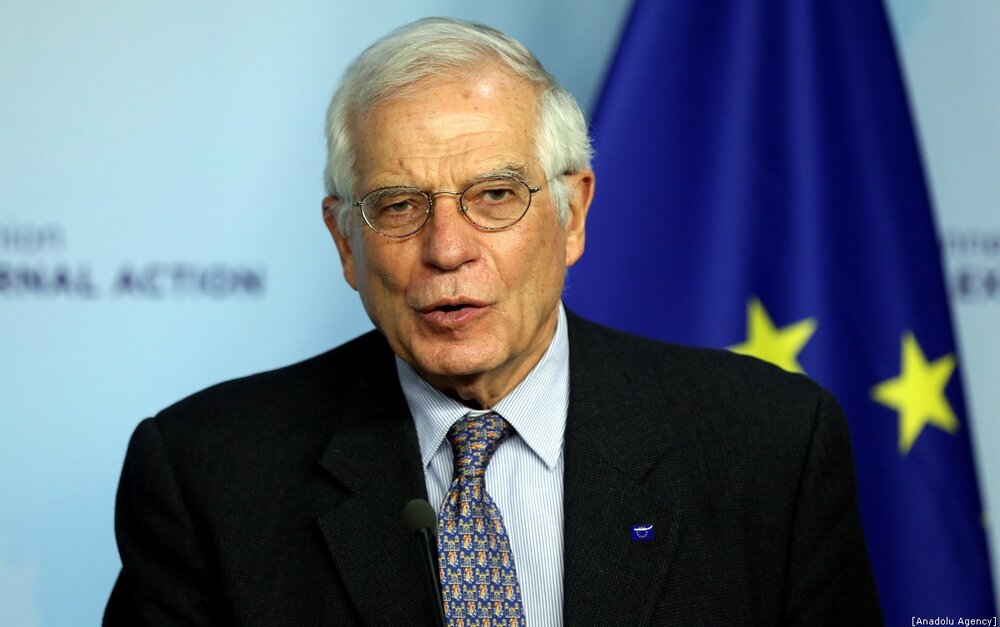Borrell says there is no alternative to nuclear deal

EU foreign policy chief Josep Borrell has said that it is urgent to preserve the 2015 nuclear deal, known as the JCPOA, because there is no effective alternative to the agreement.
“Today, the JCPOA is under great pressure on multiple fronts. I am convinced that action to preserve it is not just necessary but urgent, for at least two reasons. First, it took more than 12 years for the international community and Iran to bridge their differences and conclude a deal. If the JCPOA is lost, no other comprehensive or effective alternative will be waiting around the corner,” he wrote in an article published by Project Syndicate on Tuesday.
Following is an excerpt of the article:
The deal would have not been possible without diplomatic persistence. It required the full buy-in not just of the United States, but also of Russia, China, and of course Iran. The final agreement was solid. At more than 100 pages, and with several annexes, it set out all of the details for a clear quid pro quo: Iran would abide by strict limitations on its nuclear program in exchange for the lifting of nuclear-related economic and financial sanctions.
The JCPOA is enshrined in international law through UNSC Resolution 2231 (which needs to be fully implemented). It stands as a prime example of what European diplomacy and effective multilateralism can achieve within the rules-based international order. But the process leading up to it was lengthy and difficult, all but ruling out another chance at a deal.
Second, JCPOA is not merely a symbolic success. It delivered on its promises and proved effective. Owing to the unprecedented level of access that it provided for the International Atomic Energy Agency, the IAEA was able to confirm in 15 consecutive monitoring reports between January 2016 and June 2019 that Iran had met all its obligations under the deal.
As such, Europe and other partners lifted sanctions, as specified in the agreement. Iran’s international isolation was coming to an end, setting the stage for restoration of normal economic and trade relations with the rest of the world. In May 2018, however, the U.S. decided to withdraw from the JCPOA and reinstate sanctions in pursuit of a new strategy of “maximum pressure.”
Although the restoration of U.S. sanctions clearly had negative effects on Iran’s economy and people, Iran continued to adhere to the deal for another 14 months. But now, Iran is once again accumulating worrying levels of enriched uranium and acquiring new nuclear know-how. The JCPOA is being further eroded, and fears from the past are resurfacing.
In January, France, Germany, and the UK formally expressed their concerns about Iran’s renewed enrichment activities and urged it to return to full compliance. Iran, similarly, has voiced its own concerns, arguing that it has not received the expected economic benefits from the lifting of sanctions.
As the current coordinator of the JCPOA, I will continue to work with all remaining parties to the deal, as well as with the entire international community. We will do everything possible to preserve what we achieved five years ago, and to ensure that the deal remains effective.
It is important to remember that the Iranian nuclear program remains under tight scrutiny, with its peaceful nature being constantly verified. Thanks to the IAEA inspections regime, we continue to know a great deal about the Iranian nuclear program, even under the current circumstances. If the agreement were to be lost, however, we would lose these insights and be set back by two decades.
I firmly believe that the JCPOA has become a key component of the global non-proliferation architecture, which is why I continue to call for all parties to remain committed to its full implementation. Iran, for its part, must return to full compliance with its nuclear obligations; but it also needs to be able to reap the economic benefits envisioned in the agreement. Having already established measures to protect our companies against extraterritorial U.S. sanctions, we in Europe can do more to satisfy Iranian expectations for legitimate trade.
The EU will intensify its efforts to build bridges and narrow the gaps among all concerned parties.
We need to return to a more positive dynamic. When the moment is ripe, we must be ready to build on the deal. The EU is willing to do so. But the first step is to protect the Iran nuclear deal as it is, in its entirety, and for all parties to comply fully with their obligations.
NA/PA

Leave a Comment